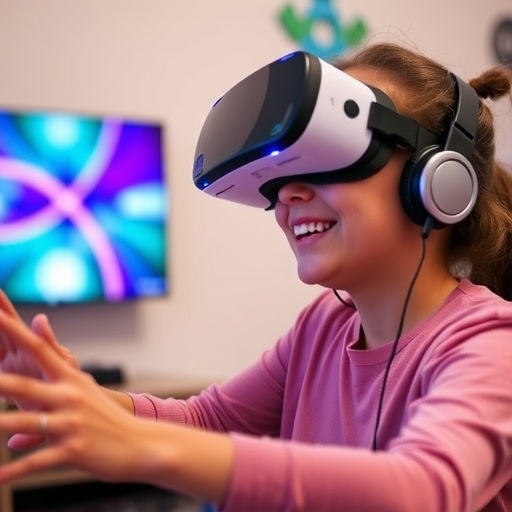In a groundbreaking study poised to transform autism spectrum disorder (ASD) therapy, researchers have integrated fully immersive virtual reality (VR) technology with psychological and behavioral interventions, unveiling promising outcomes that could redefine therapeutic landscapes. This innovative approach, detailed in a 2025 publication in BMC Psychology, explores the synergistic potential of cutting-edge VR environments combined with established psychological strategies, revealing new dimensions in enhancing social and cognitive skills among individuals with ASD.
Autism spectrum disorder, a complex neurodevelopmental condition characterized by difficulties in social communication and repetitive behaviors, presents unique treatment challenges. Traditional interventions often require times of prolonged commitment and can yield variable outcomes depending on individual differences. The incorporation of fully immersive VR technology offers a controlled and customizable platform where therapeutic exercises can be tailored interactively, facilitating more engaging and potentially more effective interventions.
The core of this study hinges on the ability of fully immersive VR to simulate realistic social scenarios while maintaining a safe and adaptable environment for patients. By transcending the limitations of physical therapy spaces, virtual reality environments can present dynamic, novel, and repeatable situations that encourage individuals to practice social cues, emotional recognition, and behavioral adjustments. This flexibility enhances learning and generalization of social skills outside therapy sessions.
Researchers leveraged advanced VR hardware delivering high-resolution, 360-degree visual and auditory stimuli that emulate real-life interactions with exceptional fidelity. This technological sophistication allows users to immerse themselves completely, reducing distractions and increasing focus on therapeutic tasks. Additionally, the VR platform supports real-time feedback and adjustment, enabling therapists to modify scenarios instantaneously based on participant responses, increasing the precision and responsiveness of interventions.
The study explored the integration of VR with established psychological and behavioral methodologies such as cognitive-behavioral therapy (CBT) and applied behavior analysis (ABA). These approaches have long demonstrated efficacy in managing ASD symptoms, but their union with immersive virtual environments amplifies their reach and impact. Through this blend, patients are empowered to actively engage in experiential learning, which is critical in translating theoretical knowledge into practical skills.
A vital aspect of the study involved measuring the impact of this integrative therapy on key ASD features, including social reciprocity, communication effectiveness, and behavioral flexibility. Quantitative assessments post-intervention showcased statistically significant improvements compared to control groups undergoing standard psychological or behavioral therapy alone. Notably, participants exhibited enhanced ability to recognize emotional expressions and participate in turn-taking during social exchanges.
Moreover, qualitative feedback from participants and caregivers underscored increased motivation and reduced anxiety levels during therapy sessions. The immersive VR setting not only alleviated the stress often associated with face-to-face social interactions but also introduced a gamified experience that simulated reward mechanisms, encouraging continued participation and practice. This motivational component is crucial for sustained engagement in long-term therapies.
From a neuropsychological perspective, combining VR with behavioral interventions may stimulate brain regions implicated in social cognition and executive functioning. Immersive environments activate multisensory integration pathways, potentially facilitating neural plasticity and improved cognitive processing. Such neurobiological effects could herald more profound and lasting modifications in how individuals with ASD perceive and interact with their social worlds.
Technical challenges were addressed meticulously during the study’s design phase. Ensuring accessibility for diverse age groups and cognitive profiles required adaptable interface designs and customizable stimuli intensity levels. Ergonomic considerations minimized physical discomfort or sensory overload, common concerns in VR deployments for neurodiverse populations. The development team integrated iterative user feedback loops to refine usability continuously.
Importantly, this research highlights the scalability potential of VR-assisted therapies. Once developed, VR programs can be disseminated widely through clinics, schools, and even home-based setups under professional supervision. Such scalability democratizes access to high-quality interventions, particularly benefiting regions with limited clinical resources or specialist availability.
The study also emphasizes ethical considerations surrounding patient consent, data security, and privacy, particularly given the immersive data collection inherent to VR systems. Protocols were established to safeguard participant information rigorously, maintaining trust and compliance with healthcare regulations. Going forward, these ethical frameworks will be essential in balancing technological innovation with patient rights.
Looking ahead, integrating artificial intelligence (AI) into immersive VR platforms promises further customization and adaptive learning capabilities. AI could analyze behavioral patterns in real-time, adjusting difficulty levels and therapeutic goals to optimize individual progression. This convergence of AI, VR, and psychology embodies the forefront of personalized medicine for neurodevelopmental disorders.
The implications of this research extend beyond ASD treatment. The methodologies and technologies explored might be adapted for other psychiatric and neurological conditions involving social and cognitive impairments. Such cross-disciplinary applications elevate the significance of VR as a versatile tool in clinical psychology and rehabilitation.
In conclusion, the synergy between fully immersive virtual reality technology and psychological-behavioral interventions opens a compelling frontier for autism spectrum disorder therapy. By elevating engagement, tailoring experiences, and potentially influencing neural mechanisms, this novel approach stands to significantly improve quality of life for individuals with ASD. Ongoing studies will be crucial in verifying long-term benefits and refining protocols for broader clinical adoption.
As VR technologies continue to evolve in resolution, sensory integration, and interactivity, their therapeutic utility is poised to expand exponentially. The study led by Li, Tian, Yang, and colleagues sets a high benchmark, charting a course toward innovative, effective, and scalable ASD interventions that harness the full potential of digital immersion.
Subject of Research: The therapeutic effects of fully immersive virtual reality technology combined with psychological and behavioral interventions on autism spectrum disorder.
Article Title: The effect of fully immersive virtual reality technology combined with psychological and behavioral intervention on autism spectrum disorder.
Article References:
Li, N., Tian, M., Yang, Y. et al. The effect of fully immersive virtual reality technology combined with psychological and behavioral intervention on autism spectrum disorder.
BMC Psychol 13, 1120 (2025). https://doi.org/10.1186/s40359-025-03460-y
Image Credits: AI Generated




